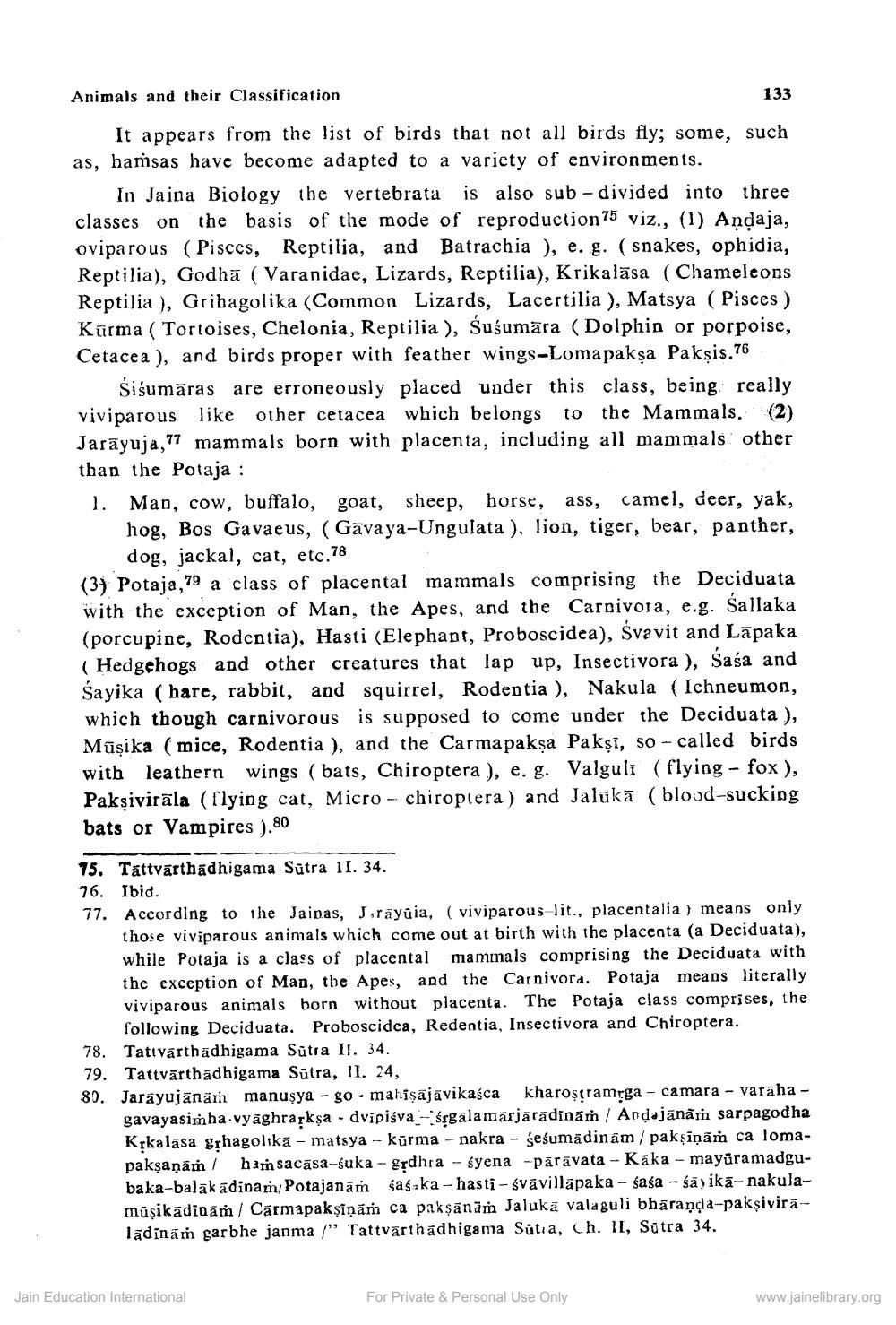________________
Animals and their Classification
133
It appears from the list of birds that not all birds fly; some, such as, hamsas have become adapted to a variety of environments.
In Jaina Biology the vertebrata is also sub-divided into three classes on the basis of the mode of reproduction 75 viz., (1) Andaja, oviparous (Pisces, Reptilia, and Batrachia ), e. g. (snakes, ophidia, Reptilia), Godhā (Varanidae, Lizards, Reptilia), Krikalāsa (Chameleons Reptilia ), Grihagolika (Common Lizards, Lacertilia ), Matsya (Pisces ) Kūrma ( Tortoises, Chelonia, Reptilia ), Susumāra (Dolphin or porpoise, Cetacea ), and birds proper with feather wings-Loma paksa Paksis. 76
Siśumāras are erroneously placed under this class, being really viviparous like other cetacea which belongs to the Mammals. (2) Jarāyuja,77 mammals born with placenta, including all mammals other than the Potaja : 1. Man, cow, buffalo, goat, sheep, borse, ass, camel, deer, yak,
hog, Bos Gavaeus, (Gāvaya-Ungulata ), lion, tiger, bear, panther,
dog, jackal, cat, etc.78 (3) Potaja,79 a class of placental mammals comprising the Deciduata with the exception of Man, the Apes, and the Carnivora, e.g. Sallaka (porcupine, Rodentia), Hasti (Elephant, Proboscidea), Svavit and Läpaka ( Hedgehogs and other creatures that lap up, Insectivora ), Sasa and śayika ( hare, rabbit, and squirrel, Rodentia), Nakula ( Ichneumon, which though carnivorous is supposed to come under the Deciduata ), Mūşika (mice, Rodentia ), and the Carmapaksa Paksi, so-called birds with leathern wings (bats, Chiroptera ), e. g. Valguli (flying - fox), Pakşivitāla (flying cat, Micro - chiroptera) and Jalūkā (blood-sucking bats or Vampires ).80
75. Tättvārthadhigama Sūtra 11. 34. 76. Ibid. 77. According to the Jaipas, Joräyuia, ( viviparous-lit., placentalia ) means only
those viviparous animals which come out at birth with the placenta (a Deciduata), while Potaja is a class of placental mammals comprising the Deciduata with the exception of Man, the Apes, and the Carnivora. Potaja means literally viviparous animals born without placenta. The Potaja class comprises, the
following Deciduata. Proboscidea, Redentia, Insectivora and Chiroptera. 78. Tativārthādhigama Sutra II. 34. 79. Tattvärthādhigama Sūtra, ll. 24, 89. Jarāyujānām manuşya - go - mahişājāvikaśca kharoştramrga - camara - varaha -
gavayasimha vyāghrapksa - dvipiśva - śrgalamärjārādinām / Andajanāṁ sarpagodha Kļkalāsa grhagolikā - matsya - kūrma - nakra - seśumādinām/pakşīņām ca lomapakşaņāṁ / ham sacāsa-suka - Erdhra - syena -pārāvata - Kāka - mayůramadgubaka-balākādinam, Potajanām saska-hasti - śVāvillāpaka - śasa - śāyikā-nakulamūşikādinam/ Carmapakşiņām ca pakşānām Jaluka valaguli bharanda-pakşiviralādināṁ garbhe janma / Tattvārthadhigama Sutia, Ch. II, Sūtra 34.
Jain Education International
For Private & Personal Use Only
www.jainelibrary.org




